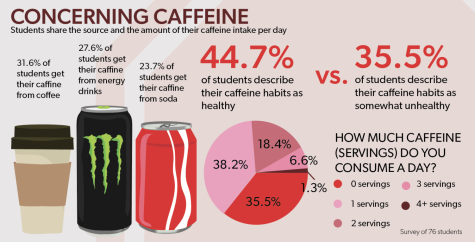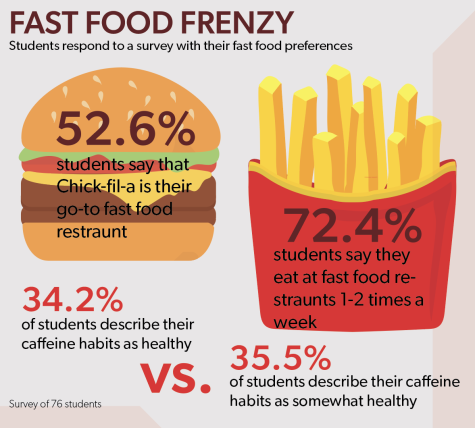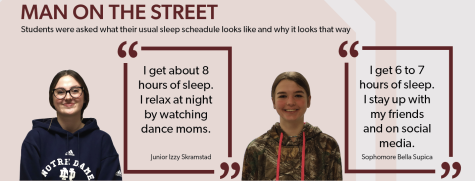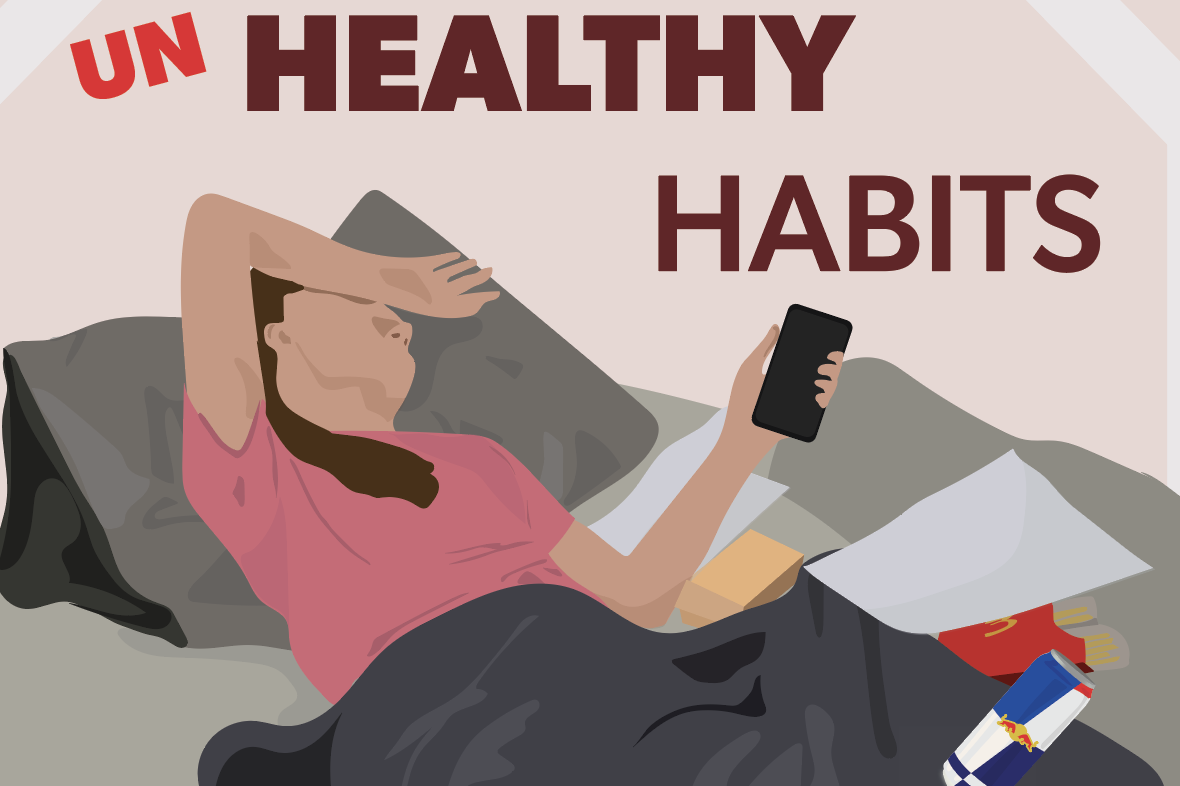Amidst hectic schedules, bad habits can be hard to break
Students discuss the unhealthy habits they have as a result of busy high school schedules.
March 20, 2023
It’s not uncommon for teenagers to have bad habits they just can’t seem to break, but when it comes to habits that affect health it gets even more complex. Experts often point to teen’s seemingly never ending schedules as a source of these habits, and address concerns for the effects these habits may have in the future. Many teens have unique struggles with keeping healthy habits a part of daily life. Students share their stories about sleep deprivation, caffeine intake and fast food consumption and how these habits affect their lives.
Craving Caffeine
Teens’ often unhealthy sleep cycles can lead to another unhealthy habit: caffeine consumption. When students can barely stay awake, turning to caffeinated beverages like coffee and energy drinks to help seems like an obvious and easy solution. However, it can also lead to health issues down the line.
Senior Jayden Mendenhall is one student who regularly drinks coffee in the morning and energy drinks before she goes to work. Mendenhall has noticed how not drinking caffeine can affect her.
“I don’t necessarily view it negatively,” Mendenhall said. “I feel like it isn’t that bad for me, but it is definitely an addiction because when I don’t drink caffeine, I can feel it. I can tell I’m going through withdrawal and stuff. I get really tired and I don’t want to talk to anybody.”
Mendenhall cites her sleep schedule as the source of her caffeine addiction.
“I think I started getting into the habit because of my lack of sleep,” Mendenhall said. “I was staying up super late, so in the morning, I started noticing that I was super tired. I just tried to make up for it through caffeine. I just got hooked on it.”
According to Lauer, although caffeine consumption can help people stay awake, it can also come with a myriad of negative effects, some more immediate than others.

“It can make us more alert but when overdone it can make us jittery, edgy [and] anxious,” Lauer said. “It is also important to keep in mind that the adolescent brain is still developing and maturing and using psychoactive medications of any type may interfere with that maturation process. Caffeine can also work in the kidneys to make us urinate more, which can lead to mild dehydration if you’re not getting in enough water.”
Mendenhall believes that the caffeine helps make her schedule more manageable.
“My average weekday is I wake up at 6:30 and I don’t stop doing stuff and working until about 9:30 at night,” Mendenhall said. “I get up in the morning, I go to school, [and] I go straight from school to work. I don’t get home until like 9:30. Without caffeine, you just wouldn’t be able to do that … You just kind of have to make up for that make up energy somehow.”
To avoid having teens’ caffeine intake affect their sleep schedules, Lauer advises students to be conscious about the amount of caffeine they are drinking and to avoid consuming it later in the day.
“The suggestion is to keep it to one cup of coffee a day, or no more than 100 milligrams a day,” Lauer said. “Remember that many soft drinks contain caffeine as well so for instance a 16 ounce Coke has 65 milligrams of caffeine. Most “energy” drinks work by adding caffeine, so you should read labels to understand what is going into your body. In addition, the general advice is to not drink caffeine after noon; everyone is different, but for some people drinking caffeine later in the day can interfere with getting good sleep that night.”
Fast Food Fixation
Finding time to prepare, cook and eat a meal is especially difficult for some teenagers, many of whom turn to fast food runs for the sake of convenience amidst their busy schedules. With packed agendas, speed and convenience can take precedence over healthy food choices, despite the dietary risks of frequent fast food meals.
According to a JagWire survey, 87.9% of students who responded eat fast food at least once a week. After school activities can frequently crowd evening schedules making it difficult to maintain healthy eating habits. This is the case for students like Cowen.
“Every Monday I go to McDonald’s after scouts,” Cowen said. “And then on most Wednesdays and Thursdays I have play practice followed by robotics. So I just go [to McDonalds] on the way”
Despite their fast food eating routines, many students, like sophomore Zacheus Chesser, who finds himself at McDonald’s more than once a week after school, are aware of the negative costs of eating fast food regularly during their week.
“It’s a lot of money that I spend instead of cooking something,” Chesser said. “But I usually try to eat dinner at home-something healthier.”

Once more, teenage schedules prove to be the bane of a healthy, home cooked meal. While most parents may disapprove of these habits, students like Chesser have found that their opinions on the matter are minimal.
“[My parents] don’t like it too much,” Chesser said. “But sometimes I pick stuff up for them so they’re not too mad about it.”
Cowen has had similar experiences with his parents and their opinions on his eating habits in addition to the reactions of his friends.
“My dad doesn’t approve too much,” Cowen said. “My mom doesn’t seem to care and most of my friends just think it’s funny.”
While medical recommendations, financial considerations and peer opinion are all factors that play into habitually eating fast food, ultimately these dietary decisions are made by the individual. According to Chesser, dietary decisions can and should be made based on the individual and their lifestyle, as they depend on fitness, finances and reasoning for the habit.
“I think if you can afford it and if you work it off, it’s pretty good,” Chesser said. “But if you just do it just to eat fast food, it’s not good for you.”
Despite the low nutritional value of fast food, Chesser finds himself eating fast food not only for the speed, but also for the price.
“I know it’s a pretty bad habit,” Chesser said. “But it’s also really convenient, so I do it a lot and it’s pretty cheap: probably like 40 bucks a week, so not that much”
Frequenting the drive-thru not only has financial costs, but physical costs as well. According to Lauer, the significance of a healthy diet outweighs the convenience of a fast food meal.
“Without a healthy diet balanced with a healthy exercise regimen, it is very challenging to stay healthy and be able to do all the things we want to in life,” Lauer said. “So it’s important for everyone, adolescents included, to understand the health benefits of a healthy diet.”
Slacking on Sleep

Getting enough sleep is a common struggle, but with balancing school, free time, activities and potentially a job, teens have an especially unique challenge in finding the time to get enough rest.
Oftentimes, teens find themselves awake late. According to senior Garrett Cowen, because he is up, he might as well fill his time.
“There’s just a lot more on my mind, so I couldn’t fall asleep anyway,” Cowen said. “So I want to distract myself.”
Junior Noah Johnson relates to this sentiment, with a variety of things that keep him from going to bed: schoolwork, hygiene habits and YouTube. Johnson explains the effects this lack of sleep has on his life.
“I have a lot of brain fog when I don’t sleep and it affects my ability to focus on schoolwork, talk to other people and everything in general,” Johnson said. “My friends also do not get very much sleep and my family, they make fun of me for it, but it’s just kind of a fact of life.”
Freshman Ian Weatherman has similar experiences with sleep to Johnson and Cowen, but differs in the sense that his family wants to help his sleep improve.
“My mom and dad are trying to fix it,” Weatherman said. “My mom has brought it up on my last few doctor visits. She’s asked the doctor how much sleep is healthy as a not so subtle hint to me. They’re trying to help me get more.”
Even with this familial support, Weatherman has struggled to get good amounts of sleep due to schoolwork.
“Some nights I go to bed earlier, but I can never get a consistent schedule with homework variation and all that,” Weatherman said. “It’s usually just working on schoolwork, after school clubs and activities and just wanting to have time by myself after a long day.”
Improving sleep is important, according to Steve Lauer, Associate Chair of the Department of Pediatrics at The University of Kansas Health System. Lauer describes some of the more serious and long-term effects of sleep deprivation.
“Poor sleep habits and sleep deprivation are associated with symptoms of anxiety and depression,” Lauer said. “A tired brain mixed with the social isolation of the pandemic, is much more likely to develop mental health issues than a rested brain. In addition, being tired makes it very difficult to get school work done, adding to the stress and anxiety of adolescence. I frequently tell parents and teens that I can’t tell a tired brain from an ADHD brain. Long term sleep deprivation makes it very challenging for the development of executive function skills to proceed in the right manner, making it eventually more challenging to do well at work or in college.”
Because of a repeated lack of sleep’s bad effects, Lauer encourages teens to find what is right for them while prioritizing their health.
“The real answer is that each person is different and the right answer for a friend may not be the right answer for you,” Lauer said. “You need enough sleep to be able to wake up feeling rested and organized about the new day.”

